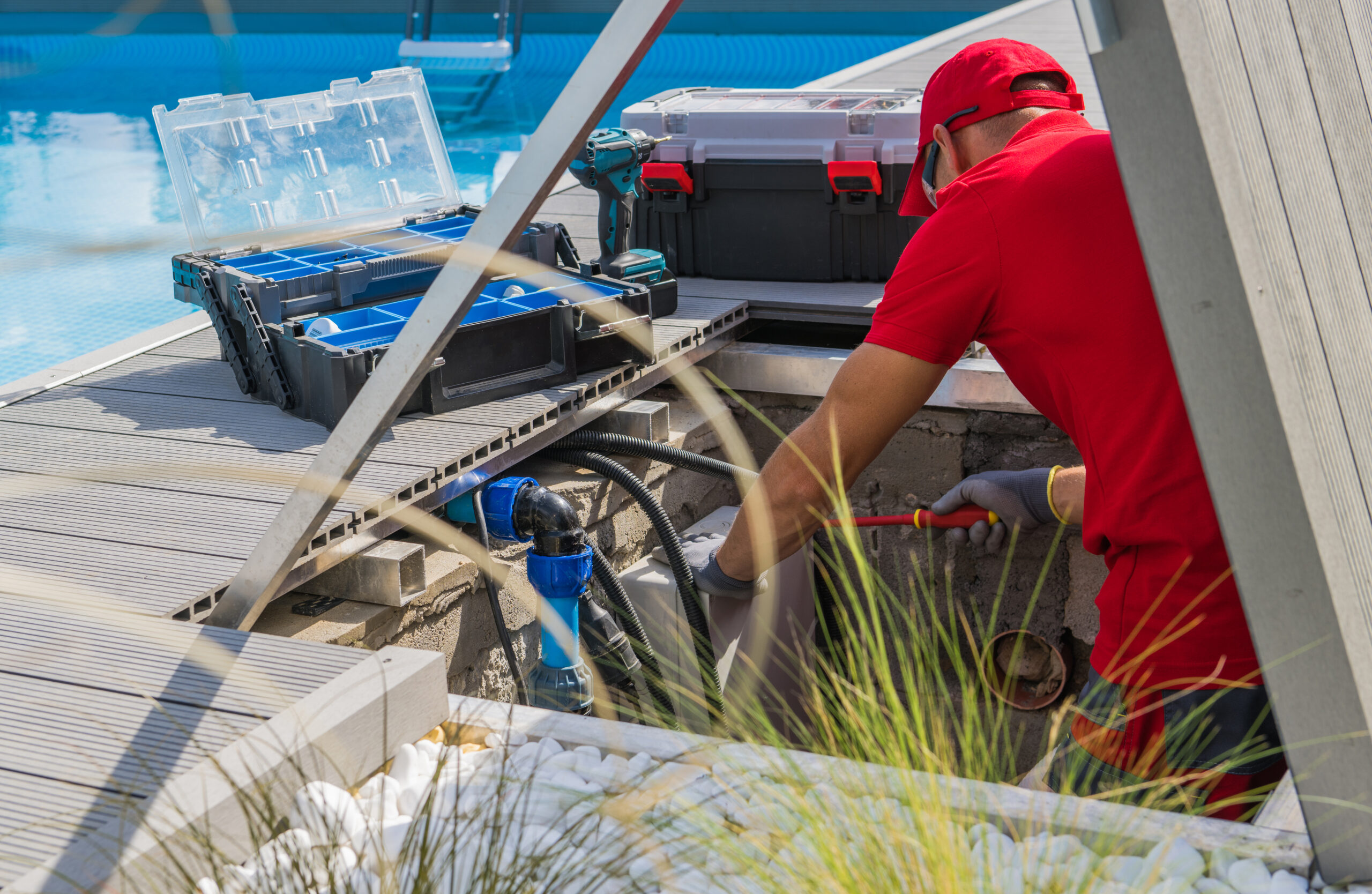You’re a landlord, and your rental property’s pool is your responsibility. You can’t afford the risk of neglecting it. It’s crucial to understand how to effectively maintain it, when to seek professional help, and what responsibilities fall on your tenants.
Dive into this guide for comprehensive insights on handling pool maintenance in a rental property that’ll save you time, money, and potential headaches down the line.
Let’s make sure you’re well-equipped for this challenge!
Understanding the Importance of Pool Maintenance in Rental Properties
You’ve got to realize the importance of maintaining the pool in your rental property. It’s not just about aesthetics but also safety and compliance with regulations. Adherence to pool safety measures can’t be overstated. Ensuring that the pool area is equipped with necessary safety equipment like life buoys, a first aid kit, and appropriate fencing reduces risks associated with swimming.
Moreover, regular cleaning and chemical balancing of your pool water are imperative. It’s crucial to prevent algae growth and bacterial contamination which can cause health problems for swimmers. Also remember, stagnant water can become breeding grounds for mosquitoes leading to increased risks of diseases.

Now let’s talk money – cost analysis of maintenance should factor into your budgeting. Regular upkeep prevents costly repairs down the line caused by neglect. Pool filters need changing periodically while pumps require routine servicing – both contributing towards keeping operational costs low in the long run.
Regular Cleaning: A Key Aspect of Pool Maintenance
Keeping your swimming area clean on a regular basis isn’t just about aesthetics, it’s crucial for the longevity of your aquatic investment. Regular cleaning involves several key steps – skimming off leaves and debris, vacuuming the pool floor, brushing off algae from walls and tile lines. But beyond these physical tasks lie more intricate sanitization techniques.
Maintaining chemical balance is a critical part of this process. It’s not enough to simply add chlorine or bromine – you’ll need to be alert to pH levels, alkalinity, and calcium hardness too. Discrepancies in these can cause damage to your pool equipment or lead to murky water and skin irritations.
You might be wondering how you can keep track of all these aspects? You should invest in a quality test kit that allows you to monitor the pool’s chemistry regularly.
Don’t underestimate the power of shock treatments either. They’re essential for dealing with algae blooms or after heavy usage periods like parties or events.
There’s no shortcut when it comes to pool maintenance. Your attention to detail now will ensure your tenants’ satisfaction and protect your investment in the long run.
The Role of Professional Pool Services in Rental Properties
It’s often worth considering the benefits of hiring professional services to manage your swimming area in tenant-occupied homes. As a property owner, you’re responsible for the safety and cleanliness of your pool, but the daily maintenance can be time-consuming. Professional pool services can provide consistent care, freeing up your time and ensuring that tenants always have a clean, safe pool to enjoy.
Consider these points:
– Service Costs: While it might seem like an added expense, professional pool services often save money in the long run by preventing costly repairs or health code violations.
– Regular Maintenance: Routine service includes cleaning filters, checking chemical levels, and inspecting equipment for wear and tear.
– Service Agreements: These contracts detail what tasks are included in regular service visits. They also specify response times for emergency situations.
By understanding service costs and agreements, you’ll appreciate how professional pool management is a worthwhile investment. It ensures consistency in maintenance which could prevent minor issues from escalating into major problems.
Ultimately, it provides peace of mind knowing that your tenants are swimming in well-maintained waters while keeping them satisfied with their living conditions.
Dealing With Pool Repairs and Renovations in Rental Properties
When it’s time for repairs and updates, you’ll find that professional services are invaluable in preserving your tenants’ enjoyment of their swimming area. It’s vital to engage experts who can conduct a thorough cost analysis, ensuring you’re getting the best value for money while maintaining high-quality workmanship.

Let’s talk about repair timelines. You need to balance swift completion with minimal disruption to your tenants’ use of the pool. A clear timeline gives your tenants a sense of certainty and reduces potential complaints or dissatisfaction.
Remember, regular maintenance can prevent costly future repairs. Thus, it’s worth investing in preventative measures which often have a lower cost and shorter timelines than extensive fixes down the line.
In conclusion, handling pool repairs and renovations requires careful planning and expert help. By focusing on cost analysis and repair timelines, you’ll ensure maximum efficiency for both your budget and your tenants’ satisfaction.
Keep in mind that communication is key; keep your tenants informed about any disruptions they may experience due to necessary pool maintenance or repairs. This way, you’ll maintain good tenant relationships while keeping their swimming space beautiful and functional.
Tenant Responsibilities in Pool Maintenance: What Landlords Need to Know
You’ve got to understand what responsibilities your tenants have in keeping their swimming area clean and safe, which can save you time and money on repairs down the line. Clear expectations should be outlined in the lease agreements, ensuring that both parties are clear on who is responsible for what when it comes to pool maintenance.
When it comes to tenant education, here are few things they need to know:
– Proper chemical balance: Tenants should understand how to maintain a healthy pH level and ensure there’s enough chlorine.
– Regular cleaning: This includes skimming leaves or debris off the surface, brushing walls and floor of the pool.
– Equipment upkeep: Tenants must know how to handle filters, pumps, heaters properly.
Remember, an educated tenant is a responsible one. So make sure you offer clear instructions on maintaining the pool. Of course, some tasks may require professional skills. For those instances, it’s best if you handle them as part of your landlord duties.
Frequently Asked Questions
What Are the Legal Requirements for Pool Safety in Rental Properties?
You’re legally required to adhere to pool regulations, which often include fencing and alarms for safety. As a tenant, it’s your responsibility to ensure these standards are consistently met in your rental property.
How Can Landlords Ensure Tenants Are Using the Pool Correctly and Safely?
You can ensure tenants’ safe pool use by setting clear ‘Pool Rules’. These should include lifeguard necessity, appropriate behavior, and equipment usage. Regularly remind tenants about these rules for a secure pool environment.
What Are the Costs Associated With Maintaining a Pool in a Rental Property?
You’ll incur costs for regular cleaning, possible repairs, and pool insurance. Cleaning schedules can vary but tend to be weekly. Insurance protects against damage or accidents. These expenses ensure a well-maintained and safe pool.
How Often Should a Pool Be Inspected for Potential Repairs or Renovations?
You should inspect your pool for potential repairs or renovations every six months. Regular checks ensure optimal pool chemistry and extend equipment lifespan, preventing costly future repairs. Don’t underestimate routine maintenance’s importance.
How Can Landlords Educate Tenants About the Importance of Pool Maintenance?
You can utilize tenant communication to stress the importance of pool maintenance. Providing a detailed maintenance schedule helps tenants understand when and what type of upkeep is needed, ensuring a clean, safe swimming environment.
